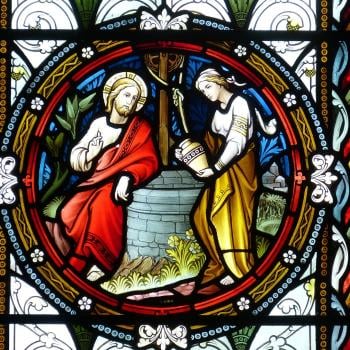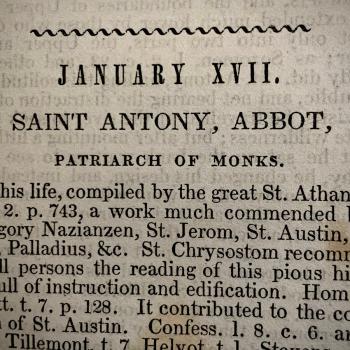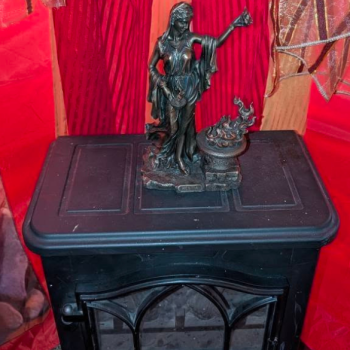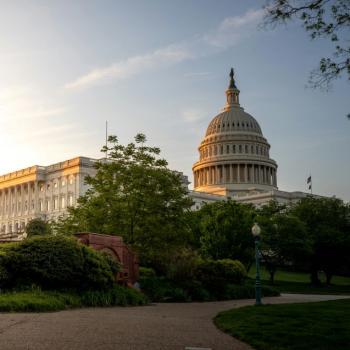In a cartoon published on Ash Wednesday, husband asks worried wife, who pores over a mountain of unpaid bills: "So what are we giving up for Lent?" She answers, "Voluntarily or involuntarily?" We are facing a long Lent now, so let's take as our mantra a similar theme: "Turn from sin and trust the good news."
The Hebrews understood "sin" as anything that prevented us from going where we're born to go. During opulent times, our possessions may have blocked us from becoming more Christ-like. Our stress on achievement may have blinded us to an identity deeper than failure or disappointment. Now we risk getting so caught up in anger and recrimination, we fail to see how the crisis might help us grow.
Survivors of the last depression learned how to make do, recycle, imagine ways of coping without money. Many experts say our nation has become so mired in excess that the downturn may furnish a necessary corrective. In hindsight, it's embarrassing to admit how much stuff we've accumulated—and how little of it we really need. We've begun to correct our reliance on retail therapy; even Target's sales are down 40 percent. But what takes its place? There, the faith has some answers.
As beloved children of God, we are more than our anxieties about health, income, or retirement. Like Jesus, we weather a bleak stretch in the desert and immense suffering during the passion to rise again. We can do so with his strength because he lives in us. We may no longer have the trendiest clothes or the newest iPhone, but we hold intangible treasure. We know ourselves as other Christs, who can pray, heal, and encourage each other as he did.
The Cultural Critic
The church has been a powerful voice for immigrants, and must continue to speak for the jobless. We can raise up the concerns of the voiceless who might otherwise be crushed by corporate greed and irresponsibility. Faith often comes alive in times of crisis, and this era is no exception.
To speak with integrity for the marginalized, we must also put our own house in order. Could some church expenditures be redirected to the service of those suffering financial distress? Can our faith communities find imaginative ways to keep faithful employees despite the crunch?
The crisis gives us a chance to ask again, "what matters?" Few children want toys as much as they long for attention, or want trinkets as much as they'd like time. While it's tough for parents to admit they can't afford the latest games, they can offer what kids might value more: one-on-one time going for walks, tossing a baseball, cooking together, discovering books and films at the library. This is a prime chance to say "no" to ridiculous advertising hype and overpriced things that offer the moon but fail to feed the soul.
The Beautifier
What lifts peoples' spirits now is what always has: the arts. The people of the Middle Ages walked through squalid streets and lived in miserable poverty. But they could lift their sights to the spires of Chartres Cathedral or see Bible stories in its luminous stained glass. Russian novelist Fyodor Dostoevsky knew the horrors of prison camp. But he wrote, "the world will be saved by beauty." Franciscan missions throughout California were built around an inner garden, lavish with bougainvillea and roses, and often a sparkling fountain. These are only three examples of a long history. For over 2000 years, the church has offered beauty at critical times for the human family.
When depression threatens or anger overwhelms, the arts move us outside ourselves and into a realm beyond the economy. They remind us we were born not only for work, but also for joy, praise, appreciation. So, in churches and homes, plant flowers. Start seeds. Turn on the music. Rehearse the choirs. Read poetry and stories, especially of saints and heroes who met formidable challenges. Treat the eyes to clean lines and rounded sculptures. Celebrate robust liturgies in the parish and simple rituals at home.
These opportunities are free or low cost. Beyond the church walls, civic sponsors also provide art shows and concerts. Now may be the perfect time to explore the parks and botanic gardens, museums and libraries, farmers' markets, cultural centers and open-air concerts. If nothing else, it's a break from the grueling job search or the bad news from the dwindling retirement funds.
The Companion
Ministers and individuals have stood often with the sick or grieving. They know that simple presence is worth more than many words. So we stand now with those most affected by the economic crisis. No words are adequate; no pathways run clearly through this unknown territory. We're all learning how to respond and adapt.
But if we have spent time appreciating the arts, we have strengthened the imagination. It then suggests new possibilities for a new era, new ways to live and different ways to cope. Jim Wallis says that the problems we face now are as formidable as mountains. It takes faith to change them, and fortunately Christians are in the mountain-moving business.
We've all had the experience of rising to an occasion. We didn't think we could do it, but the need of a child, a relative, or a friend was so great, we reached into our depths and responded. Sometimes we surprise ourselves, not knowing we had such stamina or wisdom. In desperate times, prophets arise. Had everything been hunky-dory for St. Francis, he might never have made his way to the public square that important day. Our times call for heroic responses as well. This is our moment; "now is the time of salvation."
This piece previously appeared in St. Anthony's Messenger. Reprinted by permission of the author.





